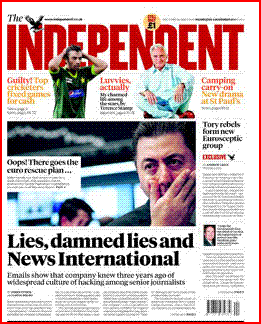Dave Clark
Hugo Rifkind in The Times [£]: "On the Hollandaise sauce, France appears convulsed by doublethink. According to their quality press, the French are far too restrained and worldly to be interested in this sort of stuff, unlike silly, prurient Anglo-Saxons. And yet, after Closer magazine broke the story, those same restrained and worldly folk bought 600,000 copies in 24 hours."
BBC News director James Harding, quoted in the Guardian: "I am acutely concerned by the pressures facing the local newspaper industry and we at the BBC will do anything to help. But the BBC's primary responsibility must be to serve licence fee payers – and they want and are entitled to the best possible local news services we can deliver."
 |
| The Independent: Launched in 1986 |
Roy Greenslade on his MediaGuardian blog: "It is hard to imagine anyone buying The Independent and therefore places the paper's future existence in jeopardy. The fact that its owner has failed to find a buyer after months of seeking one suggest that its newsprint days are coming to an end. Though the financial losses have been significantly reduced over the past three years - down from more than £20m to just below £9m - the Indy's circulation has fallen to a level that no longer makes the paper a viable proposition."
Robert Jobson
Peter Preston in the Observer: "And if Hacked Off, in the name of yet another hand-picked judge, Brian Leveson, can't engage in reasoned debate rather than invective, many of us may begin to wonder whether too much hysteria (on both sides) hasn't knocked common sense right off the agenda. Which would be truly absurd."
The Grey Cardigan on TheSpinAlley: "SOME USEFUL digging by industry tweeter @tabloidtroll into the accounts of the Media Standards Trust has revealed that the National Union of Journalists spent £4,000 helping to fund a series of fringe events organised by the Hacked Off organisation at the three political party conferences in 2012. To put that figure in context, it equates to the annual subs of 24 poorly-paid regional newspaper journalists. So were these union members asked if they wanted their money spent supporting an anti-press freedom pressure group run by left-wing activists, bitter academics and failed hacks? Of course not. Don’t be silly."
John Francis, editor of the Hemel Hempstead Gazette on the closure of the paper's office, on HoldTheFrontPage: “Where will our new office be, you might ask. Well, for now at least we haven’t got one – because we just don’t need it. Like many other organisations, we’ve realised that maintaining expensive town centre offices doesn’t make sense any more...Each member of our editorial team has a high-tech box of tricks that allows them to file copy, take pictures or record video, update our website and even send pages to press from wherever they are."
Ian Burrell in the Independent: "Immigration is a dangerous issue in the hands of the media. We have an obligation not to hide from the problems it might cause or the prejudices faced by some who make homes in this country. But it’s easy for news organisations – by their nature sensationalist – to make a difficult situation worse."
Jeremy Vine
Greenock Morton FC boss Kenny Sheils on why he won't speak to the press after matches on medical advice, as reported by HoldtheFrontPage: “It’s important I don’t compromise my position as manager of Morton Football Club. There’s a name for it – you can’t help it. If someone asks you a question, you’re emotionally imbalanced at that time and you feel an urge to tell the truth."

























